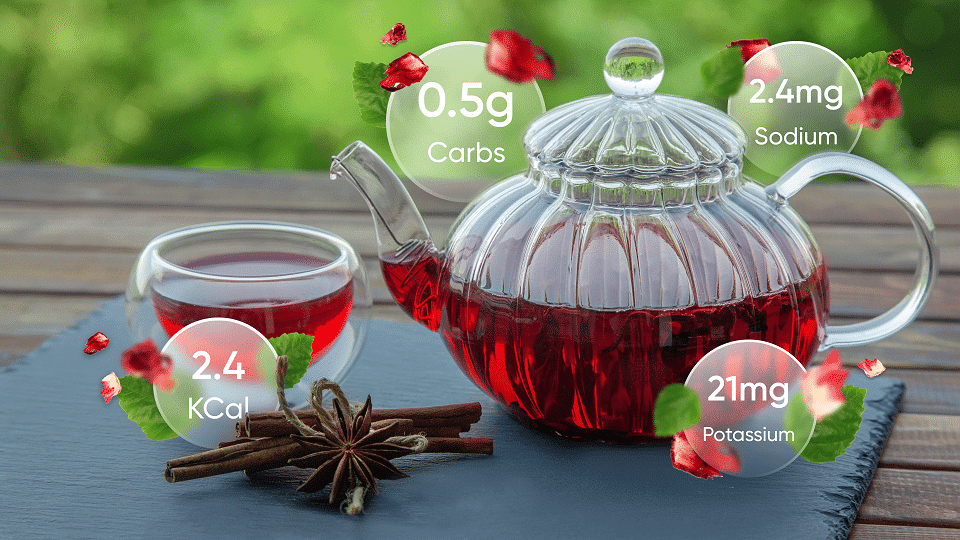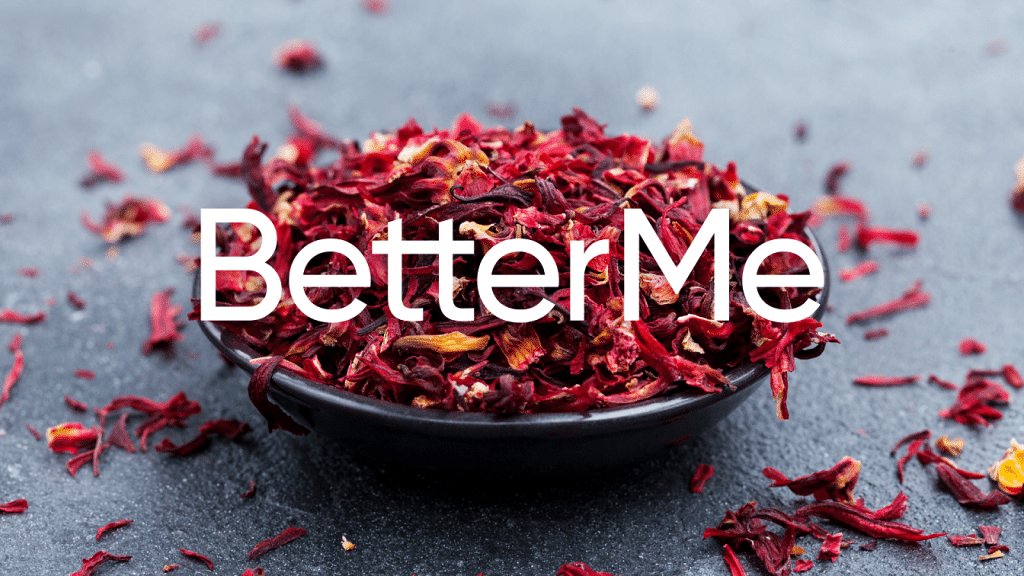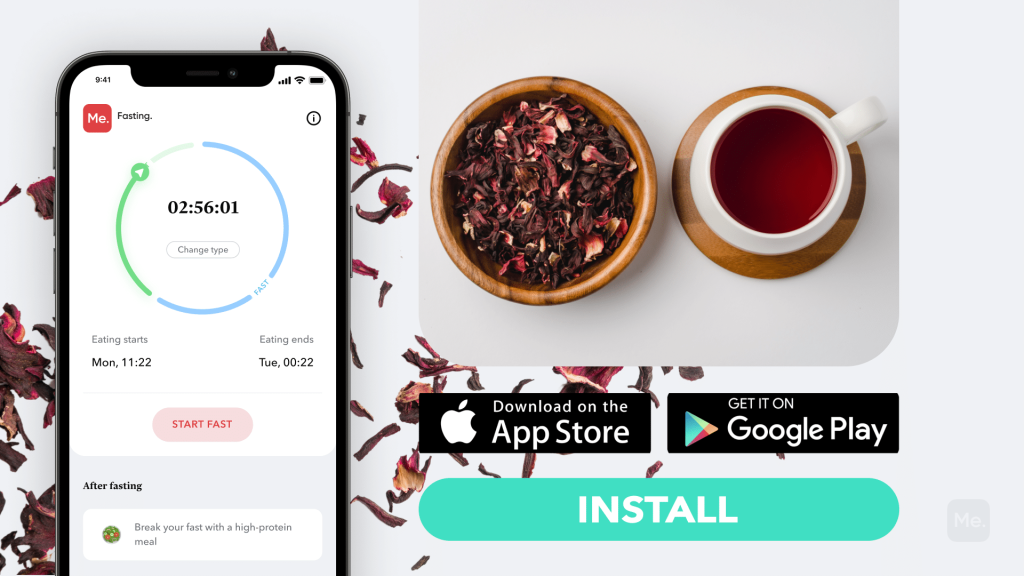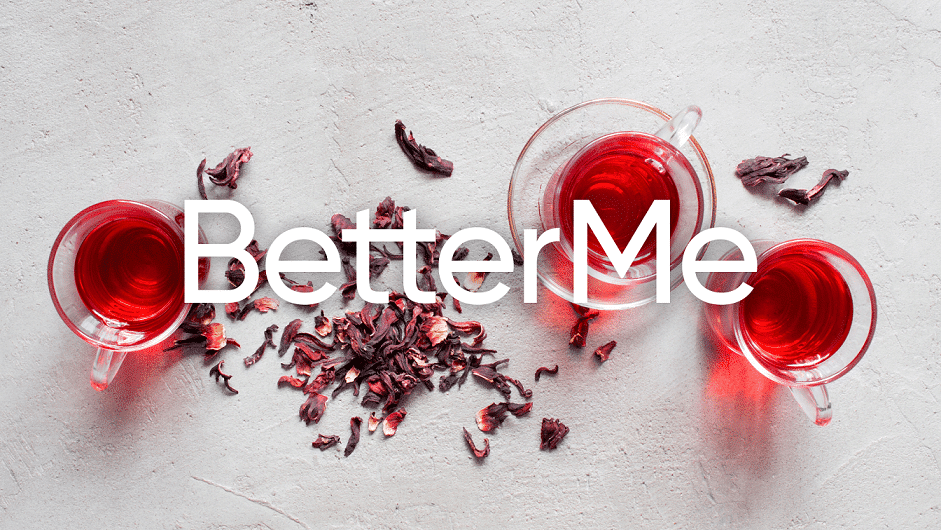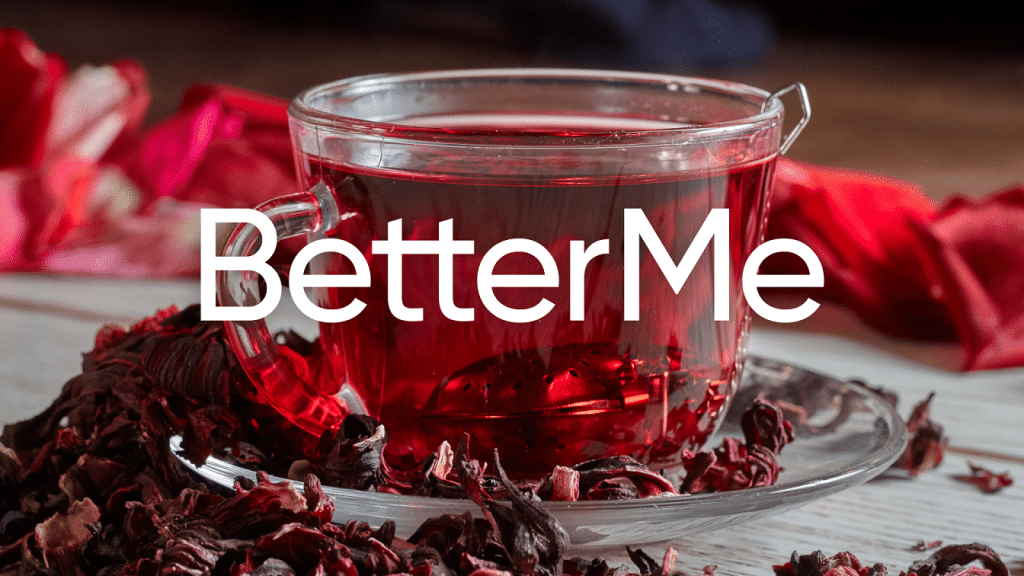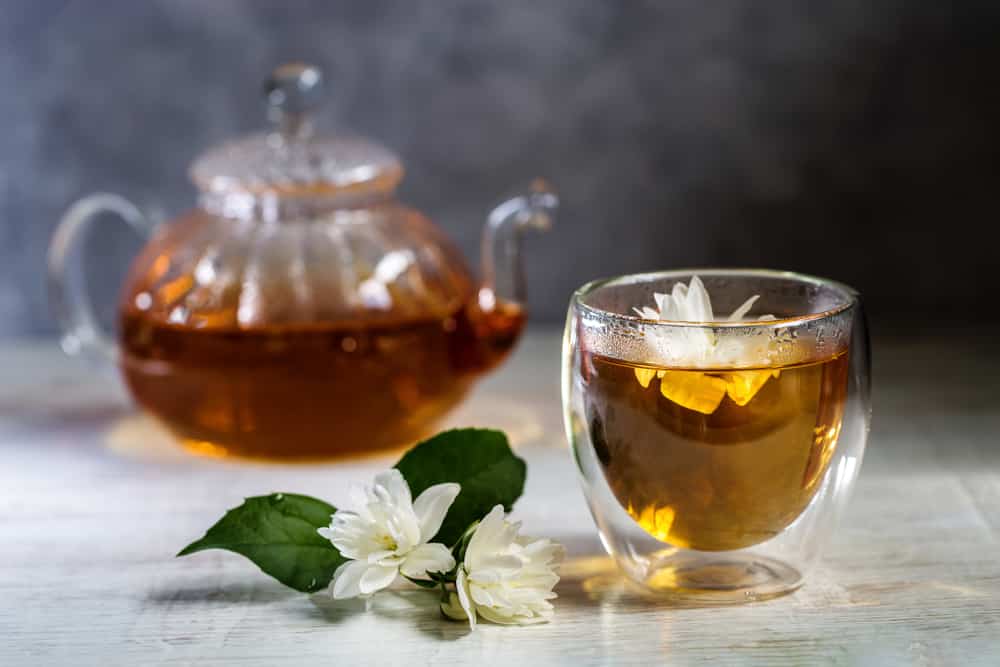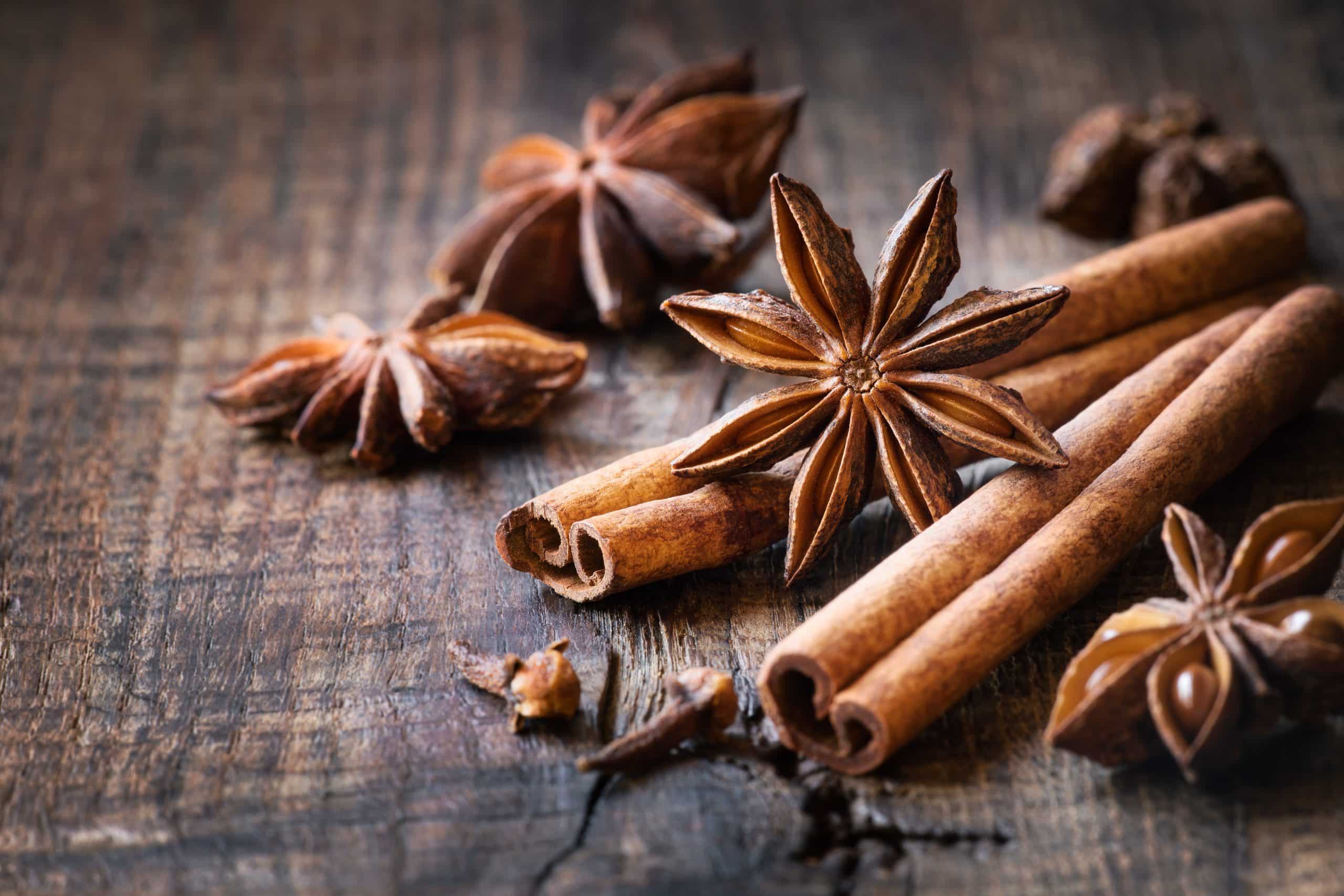Hibiscus tea is one of the many different types of tea that has gained popularity over the years. It was traditionally consumed by different cultures, however, as more people learned of its possible health benefits, they began to embrace it. Today, you will find this tea being sold in almost every food court and restaurant. Even so, its popularity is not a solid reason to try it. Join us as we explore potential hibiscus tea benefits, which offer more concrete reasons why you should add this drink to your diet plan.
What Is Hibiscus Tea?
Hibiscus tea is made from the dried parts or the beautiful flowers of the hibiscus plant known as Hibiscus sabdariffa (7). The plant’s origin is Southeast Asia and North Africa, but it is now grown in tropical and subtropical climates (7).
The flowers have a deep red color that you also acquire when preparing hibiscus tea. Besides the flowers, you can also prepare this herbal tea using the part that protects and supports the flower known as the calyx (7).
Its dried form is used to make this brew. However, you do not throw away the hibiscus plant after getting your cup of tea. Instead, the plant is also used to make agua de Jamaica, Karkade, Lo-Shen, red sorrel, sour, and Sudan tea (1).
Hibiscus Tea Health Benefits
This tea is naturally calorie and caffeine-free. It is, therefore, an excellent calorie-free drink option for dieters. However, it would be best if you talked to your doctor and nutritionist for more insight on the best calorie-free drinks.
Additionally, hibiscus tea is naturally tart. For more flavor, individuals often add sweeteners like sugar or honey. However, remember that these sweeteners contain calories and carbs. Take note of this if you count the number of calories you are consuming or are trying to maintain a calorie deficit for weight loss. Below are some of the nutrients you acquire from drinking this herbal tea, plus their possible benefits:
Packed With Antioxidants
Hibiscus tea is loaded with antioxidants. These are molecules that protect your cells from damage that is caused by oxidative stress (5). Oxidative stress can be caused by smoking, tissue trauma due to an injury or inflammation, excessive exercise, or mitochondrial activity (5).
It may also be caused by radiation, UV exposure, industrial solvents, air pollution, and exposure to chemicals like drugs and pesticides (5). In addition, damage caused by excessive oxidative stress may result in vision loss, cancer, or atherosclerosis (5).
Antioxidants are believed to reduce these risks, thereby possibly reducing your risk of health conditions like cancer. However, studies have found conflicting results, in some cases even finding that antioxidant supplements increased the risk or progression of certain cancers.
More studies are needed to study in detail the effect of antioxidant supplements on disease risk and in disease progression. Similarly, more studies are required to determine the number of antioxidants in hibiscus tea and how they may influence cancer risk.
Read More: Herbal Tea Facts, Health Benefits And Side Effects
Can Help Reduce Blood Pressure
Hibiscus tea is best known for its reported effectiveness in lowering blood pressure. Therefore, a 2019 study was conducted to evaluate the effect of taking hibiscus herbal tea on hypertension. So, it assessed the antihypertensive effect of the hibiscus herbs on patients with stage one hypertension (2).
The participants were divided into two groups: the control and the case group. Both groups were exposed to the same lifestyle and dietary measures for blood pressure control. However, the case group was additionally provided with two cups of hibiscus tea every morning for four weeks (2).
The study findings reported a reduction in systolic blood pressure in both groups (2). Systolic blood pressure, also known as the first (higher) number, measures the pressure in your arteries when your heart beats.
However, the mean reduction was higher in the case group, which also reported a high decrease in diastolic blood pressure (2). Diastolic blood pressure, also known as the bottom number, reads the pressure in the arteries when your heart rests between beats.
So, the study concluded that taking sour hibiscus tea two times a day can effectively manage blood pressure in patients with stage one hypertension. However, patients should also modify their lifestyle and dietary patterns (2).
Combats Obesity
A 2017 review was conducted to evaluate the molecular effects of Hibiscus sabdariffa polyphenols on obesity. The running theory is that these polyphenols can improve obesity-related conditions (6).
So, the study investigated the multi-targeted mechanisms, including oxidative stress, energy metabolism, and inflammation pathways (6). The study determined that there was sufficient evidence to conclude that hibiscus extract combats obesity-related pathologies.
Other researchers conducted a 2019 review investigating the effects of natural bioactive compounds in hibiscus sabdariffa on obesity to validate these findings. The study evaluated the impact on parameters linked to obesity development, such as the effect of hibiscus sabdariffa extract on body weight (1).
It also evaluated the effects of the extract on cholesterol metabolism, lipid accumulation, and plasma parameters (1). The study findings revealed that the compounds significantly reduced the parameters, promising better outcomes in obesity treatment (1).
Even so, it would help if you kept in mind that drinking hibiscus tea will not entirely combat obesity on its own. It would help if you modified your behavior for the management of obesity by upholding healthier practices. For example, exercising and reducing sedentary activities like spending so much time sitting or watching television.
If you’ve mustered up the courage to crush your weight loss goal, let Betterme take the sting out of this demanding process. Our app will help you restructure your habits, remold your life and crank up your fitness results!
Promotes Weight Loss
Drinking hibiscus tea is also believed to help promote weight loss. The rationale behind this is that, firstly, hibiscus tea does not contain any calories. As we all know, the foundation of weight loss is consuming fewer calories than your body is burning.
Drinking hibiscus tea can help you maintain a calorie deficit which enables you to maintain or create a calorie deficit for weight loss. Secondly, drinking hibiscus tea is believed to help with weight loss because it contains phenolic compounds, anthocyanins, and flavonoids.
Experts argue that these compounds regulate the genes involved in lipid metabolism and promote fat elimination (1). In addition, they also mitigate adipocyte hypertrophy, which helps reduce the size of the fat cells (1).
These are examples of the running theories on hibiscus tea could promote weight loss. However, more research is required to provide more concrete evidence on the association between hibiscus tea and weight loss.
Until there is more concrete proof, you are advised to implement other scientifically-proven weight-loss interventions. These include exercising, taking low-calorie, high-volume foods, avoiding alcohol, and sugary foods and drinks.
May Reduce Risk Of Several Diseases
In addition to the listed benefits, drinking hibiscus tea has also been suggested to reduce the risk of numerous diseases. One of them is cardiovascular disease. As we have mentioned earlier, this brew may help lower your blood pressure.
Lowering your blood pressure if it is borderline high reduces your chances of developing hypertension, which is one of the risk factors for heart or cardiovascular disease. Additionally, this drink has also been seen in animals to help increase HDL “good” cholesterol levels and reduce LDL “bad” cholesterol levels (1).
Increased LDL cholesterol levels in your body are also a risk factor for cardiovascular disease. Drinking hibiscus tea might also improve parameters that could reduce your risk of metabolic syndrome and diabetes (1).
By looking at this list of potential benefits of drinking hibiscus tea, you may be interested in reaping a few or all of them. So, you may be thinking of adding this tea to your diet plan. However, may we remind you that you should not make any major dietary changes or add any supplements without first speaking to a healthcare professional. This is especially important if you are being treated for any conditions or are on medications.
If you are safe to drink the tea, they will give you the go-ahead. However, if you are not, they may recommend other safe alternatives with similar health benefits.
Read More: White Peony Tea Facts, Health Benefits And Side Effects
Hibiscus Tea Side Effects
Despite contributing to numerous health benefits, experts acknowledge that hibiscus tea has some possible adverse side effects. They include:
Liver Damage
First and foremost, Medical News Today reveals that taking too much of this tea can result in liver damage (7).
The liver plays essential roles in your body, such as fat, protein, and carbohydrates metabolism.
It is also responsible for enzyme activation, bile production and excretion, glycogen storage, minerals, and vitamins. When it is damaged, your body cannot appropriately perform these functions.
Drug Interactions
Additionally, drinking this tea has also been linked to several side effects if it interacts with various types of medications (7). For example, studies reveal that hibiscus tea can be unsafe to take alongside chloroquine for malaria (7).
The two interact, and this herbal tea decreases the efficacy of the medicine in your body (7). So again, it might not be a good idea if people take medications for diabetes or high blood pressure. Hibiscus tea is known to lower your blood pressure and blood sugar levels, and the combination of the tea and your medication could make them drop too low (7).
So, be very cautious when you are taking this herbal tea. Hibiscus tea also interacts with medications like diclofenac (Voltaren) and alters its effects on your body (4). Similarly, it interacts with simvastatin (Zocor) and increases the speed at which your body gets rid of it (4).
So, it would be best if you talked to your doctor if you take such medications or drugs for any of these medical conditions. Even if it is a minor interaction that makes you experience fewer adverse side effects, it is essential to consult with professionals.
Reasons why BetterMe is a safe bet: a wide range of calorie-blasting workouts, finger-licking recipes, 24/7 support, challenges that’ll keep you on your best game, and that just scratches the surface! Start using our app and watch the magic happen.
Health Problems
Taking this tea may also be unsafe because it could result in side effects like gas, stomach upset, and constipation (4). Although these effects are uncommon, experiencing them is possible if you consistently drink this tea.
According to WebMD, hibiscus tea has been used safely in amounts up to 720 ml daily, for up to six weeks (4).
These are some of the side effects associated with drinking hibiscus tea. More importantly, you are advised to consult with your doctor because not everyone can consume this brew. According to WebMD, special precaution is required among individuals who are:
- Pregnant. Drinking hibiscus tea has been deemed unsafe for pregnant women because it may stimulate a menstrual cycle or terminate the pregnancy (4). You are, therefore, advised to talk to your doctor for more insight on the best foods to consume for a healthy pregnancy.
- Breastfeeding. Breastfeeding women are also advised to keep away from hibiscus tea because it may be unsafe. Food experts acknowledge that the tea might have harmful effects on the infant (4).
- Undergoing Surgery. Our discussion above shows that hibiscus tea affects your blood sugar levels and lowers your blood pressure. For this reason, it may not be easy to control your blood sugar levels during and after the surgery if you recently consumed this brew. So, you are advised to avoid using this tea at least two weeks before your scheduled surgery (4).
The Bottom Line
Hibiscus tea is one of the most flavorful yet beneficial teas. The brew is made from the beautiful flowers or the calyx of the hibiscus plant. Hibiscus tea benefits range from the possibility of promoting weight loss, reducing disease risk, combating obesity to being packed with antioxidants. However, note that this tea has its side effects and is not suitable for some individuals. So, it would be best if you talked to your doctor before adding this brew to your drinks of choice.
DISCLAIMER:
This article is intended for general informational purposes only and does not address individual circumstances. It is not a substitute for professional advice or help and should not be relied on for decision-making. Any action you take upon the information presented in this article is strictly at your own risk and responsibility!
SOURCES:
- Beneficial Effects of Natural Bioactive Compounds from Hibiscus sabdariffa L. on Obesity (2019, ncbi.nlm.nih.gov)
- Effect of hibiscus sabdariffa on blood pressure in patients with stage 1 hypertension (2019, ncbi.nlm.nih.gov)
- Effects of Antioxidants in Human Cancers: Differential Effects on Non-Coding Intronic RNA Expression (2016, ncbi.nlm.nih.gov)
- Hibiscus sabdariffa (2020, webmd.com)
- How can antioxidants benefit our health? (2018, medicalnewstoday.com)
- Multi-Targeted Molecular Effects of Hibiscus sabdariffa Polyphenols: An Opportunity for a Global Approach to Obesity (2017, ncbi.nlm.nih.gov)
- What’s to know about hibiscus tea (2018, medicalnewstoday.com)
